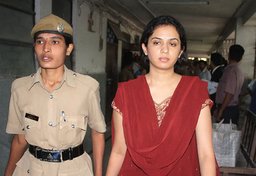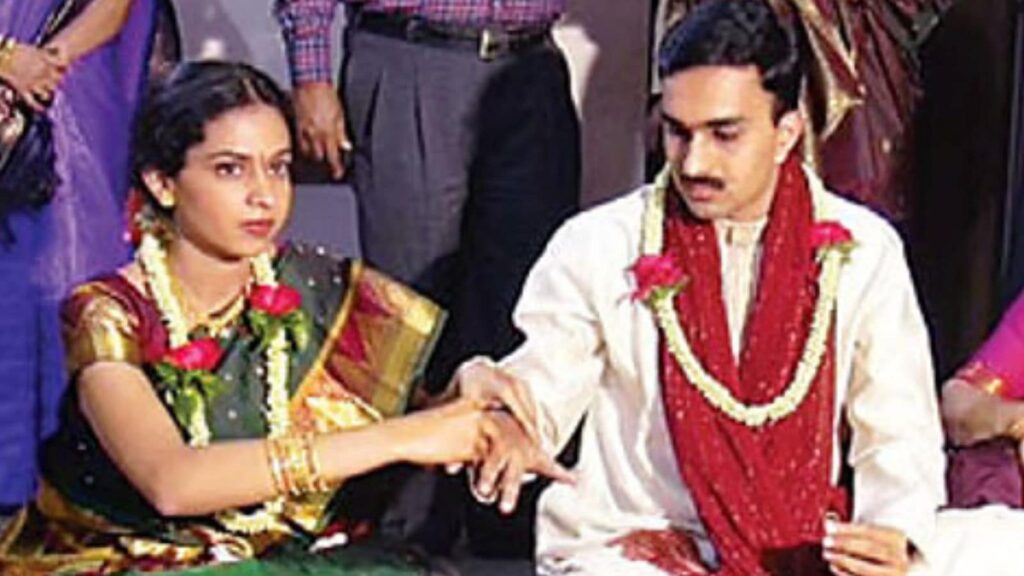More than two decades ago, a newly engaged couple stepped out for dinner on a cold December night in Bengaluru. On their way back home, they decided to stop and watch planes taking off in the air. The decision would prove fateful, ending in one of them being murdered—a crime that would shock the city and the state as the case took an unimaginable turn in the days to come.
It was 2003. B V Girish, 27, was a young software professional in Bengaluru, working at a high-paying job at Intel. His family, who stayed in Banashankari Second Stage, were looking for a bride for him. It was then that advocate Shankaranarayan, one of their neighbours and somebody they had known for around 15 years, suggested an alliance with his daughter, Shubha.
Shubha, 21, was a fifth-semester student of Integrated LLB at BMS Law College in Bengaluru. The families met, and the marriage was fixed. On November 30, 2003, Girish and Shubha’s engagement was held in Bengaluru, with the wedding date fixed on April 11, 2004.
The families were overjoyed, eager to see the couple build a future together—but it was not to be.
 Kumar, who helped Shubha take the grievously injured Girish to the hospital, provided the police with their first clue. (Express Photo)
Kumar, who helped Shubha take the grievously injured Girish to the hospital, provided the police with their first clue. (Express Photo)
The murder that shook Bengaluru
Following the engagement, Girish and Shubha, who had only been exchanging messages until then, started meeting in person. On December 3, four days after the engagement, the couple met for dinner. At around 9.30 pm, the duo, who were on Girish’s scooter, decided to stop near HAL airport to watch planes take off. The decision would prove costly.
A man struck Girish on the back of his head with a blunt object. Shubha, who was standing next to Girish, screamed for help. Hearing her cries, a passerby, Armyman Sujesh Kumar, rushed to help and took Girish to a hospital. However, it was too late. Girish was dead.
Around 10.15 pm, Police Inspector K Nanaiah was winding up his day at the Vivek Nagar police station when Shubha arrived and reported the murder. She told the police that she suspected it was a robbery bid as she was wearing gold jewellery.
Story continues below this ad
Speaking to The Indian Express, Nanaiah, who is retired now, recalled that within five minutes after she reached the police station, a senior police officer called. “It was clear that I would be investigating a high-profile murder case,” Nanaiah said.
The case takes an unforeseen turn
Kumar, who helped Shubha take the grievously injured Girish to the hospital, provided the police with their first clue. “They put Girish in the back seat and rushed to Manipal hospital. The Armyman said that Shubha came and sat with him in the front seat. Her fiancé was bleeding in the back seat,” Nanaiah recalled, saying that the tiny detail rankled.
By then, the police were under pressure to solve the case. “Shubha’s father was a known advocate. I was getting phone calls from senior police officers,” he said, recollecting how he was even being accused of harassing Shubha by frequently questioning her.
Nanaiah and his team visited Intel and found that nobody had any grudge against Girish. “His colleagues enjoyed his company. He was a pragmatic person,” a police officer said.
Story continues below this ad
With no leads forthcoming, the police decided to get the call detail records (CDR) of Girish and Shubha. The CDRs were revelatory and turned out to be a turning point in the investigation.
Frequent calls and a new subject of interest
Checking the CDRs, the police noticed that Shubha allegedly called Arun Verma, 19, a junior at her college, every day, more than she called Girish. “If Shubha and Girish had exchanged two calls daily, it would be 12-15 with Arun. He became a subject of interest, and we started collecting information about him,” the officer said. Arun was the son of a joint director of a government department, an influential person, the officer added.
Despite mounting pressure, the investigation team decided to lie low and not pick anyone up for questioning. However, they continued to gather details about Arun and Shubha’s association and soon learnt that they were allegedly in a relationship.
“Two police constables were sent to track Shubha and Arun’s movements,” Nanaiah said. The probe team also spoke to Shubha’s friends and a beautician she often visited. It was confirmed. Shubha and Arun were in a relationship, and she was unhappy about the alliance with Girish, the police said.
Story continues below this ad
Messages lead to a breakthrough
It was the early days of mobile phones. The police managed to collect the messages between Shubha and Arun, and they allegedly reconfirmed that they were involved in killing Girish. While there were hundreds of messages between the two, the police focused on those exchanged a few hours before and after Girish was murdered.
“Of the hundreds of messages, the SMSes shared between 2 pm and 10.30 am on December 3 and 4, 2003, were the most significant. On December 4, 2003, Arun sent a text, ‘I hope everything is okay, I am worried’. To this, Shubha replied calmly, saying that everything was under control,” the officer said.
More than a month after the incident, on January 21, 2004, the police arrested Arun. Within minutes, Shubha, Dinakar alias Dinesh, Arun’s cousin, and Venkatesh, the alleged murderer, were also arrested. “It took just one hour to arrest all of them. They never suspected anything amiss and were roaming freely,” Nanaiah recalled, with a laugh.
According to the police, Shankaranarayan allegedly learnt that Shubha and Arun were in a relationship, and fixed her wedding. Unhappy, Shubha and Arun decided to murder Girish, the police claimed.
Story continues below this ad
Dinesh hired Venkatesh to execute the murder, the police said. Shubha was told to take Girish to ‘Air View Point’ located near HAL on Airport Road. Venkatesh followed them and hit Girish with an iron rod, the police said.
What came as a shock to the police was that Venkatesh had allegedly killed Girish for a paltry Rs 1,500 and a mobile phone.
Sentenced to life imprisonment
The Girish murder case became a sensation after Shubha was arrested. In July 2010, a special fast-track court convicted all four accused—Shubha, Arun, Dinakar, and Venkatesh—finding them guilty of murder and criminal conspiracy. The accused were sentenced to life imprisonment, with Shubha being given an additional three years for attempting to destroy evidence.
It was a landmark case in Karnataka’s legal history as the court considered the SMS time stamps, call records and messages as evidence to convict the killers.
Story continues below this ad
The accused approached the Karnataka High Court in 2010, challenging the order, but in November, the high court junked their appeal.
In 2012, Shubha moved the Supreme Court, challenging her conviction, and secured bail. On July 14 this year, the Supreme Court upheld the judgment of the lower court but allowed Shuba to submit a mercy petition before the Karnataka governor.
“We do not wish to end our judgment by merely rendering a conviction. We do believe that this court has a little more role to play. Considering that we started our discussion keeping in mind that this unfortunate event would not have occurred had the family been more sympathetic in understanding the mental predilection and disposition of A-4 (Shubha), it is important for us to make certain observations. Ultimately, A-4 was unable to make a decision for herself, despite being an individual who had attained majority. Having said so, we cannot condone her action as it resulted in the loss of an innocent life of a young man,” the Supreme Court said in its order.
“They were not born as criminals, but it was an error of judgment through a dangerous adventure which led to the commission of a heinous crime. It is difficult for us to decide at this stage who influenced the other, although there is a clear meeting of minds,” the order stated.
Story continues below this ad
A family’s pursuit of justice
According to Nanaiah, Shubha’s family links to the law and judiciary led her to believe that she could get away with the murder. “Things turned out exactly the opposite,” he said.
Speaking about the recent Supreme Court judgment, Nanaiah said the credit went to Girish’s family. “Girish’s father, Anantha Narayana Rao, was in his 70s when the crime was committed. He followed every court hearing till his last breath in 2007. Girish’s sister also relentlessly pursued the case,” Nanaiah added.
Sunitha B V, Girish’s sister, said that giving up was never an option. “My brother was an innocent person. He did not know anything,” she said, adding, “Shankaranarayan was our neighbour, and our families had known each other for 15 years. The proposal was brought by Shankaranarayan himself. It cost us our brother.”


